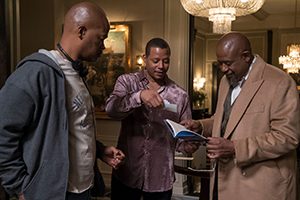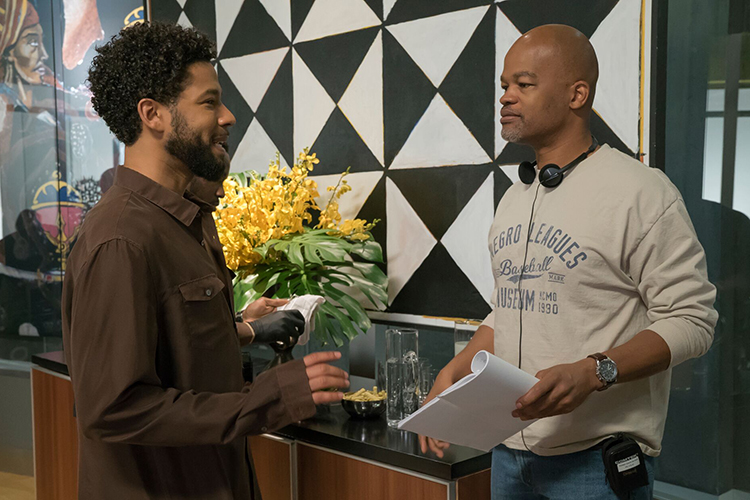Eric Haywood was a writer and co-executive producer on the popular Fox television series “Empire,” about a powerful family’s hip-hop music and entertainment business. He left that show recently to become co-executive producer for the series “Power,” on the Starz cable network. He’s part of the team writing Season 6 for the drama about a nightclub owner who also becomes involved with a drug empire. Season 5 started in July, and Season 6 will air next year.
Haywood, who directed music videos and wrote screenplays at UWM, has also written for ABC’s “Private Practice,” Showtime’s “Soul Food: The Series” and NBC’s “Hawaii,” as well as the movie “Four of Hearts.”
A 1992 UWM graduate with a bachelor’s in film, Haywood talked recently about his career and his time at UWM.
How did you first become interested in filmmaking?
I’ve always loved television, comic books and movies and telling stories. It wasn’t until I was in high school that I realized that you could actually go to school and learn how to make movies.
How did your time at UWM contribute to your career?
UWM was great in that it taught me the fundamentals of filmmaking, the filmmaking process, and it lit a fire under me to get myself into a position to do it professionally. I sort of jumped the gun and started taking on paying clients while I was still taking classes.
Do you remember any particular faculty members who were influential?
One who was a big influence on me was Iverson White — he taught filmmaking as well as screenwriting. A lot of the things I learned in my screenwriting classes are principles that I still use today.
Do you have a favorite aspect of what you do?
I think the process of actually coming up with an idea and figuring how to put it on paper and then watching an actor say the words you come up with is something that never gets old. I still to this day enjoy seeing all aspects of the process, but particularly the end result where you can actually see the scene that you wrote come to life.

Why do you think “Empire” is so popular?
I think the music is obviously a big draw. I think the casting was extremely well done… the public really likes those actors and those characters, and, frankly, one of the things we’ve always known is that the show was a throwback to the prime time soap operas that were really big in the 1980s. You have this immensely wealthy family, and yet money hasn’t solved any of their problems, and in some cases it has made their problems worse. So, it is simultaneously aspirational and also a cautionary tale.
Do you have any favorite episodes of the show or favorite films that you’ve done?
I think my favorite episode of “Empire” was the first one I wrote. There was a moment early in the episode where Cookie meets her ex-husband in a hotel. She thinks he has invited her there to rekindle their relationship and it turns out he has invited her, as well as the whole family, so he can announce his engagement to his new girlfriend. Then Cookie, in a fit of anger, opens her fur coat and reveals she has nothing on underneath except lingerie. That is a moment that really helped cement the characters in the eyes of the audience.
Did you think that show was going to be the huge success that it ended up being?
Nobody knew because that degree of success is unknowable. I had a very strong sense it would do well enough to get a second season. But that is as far as you dare hope anytime you are working on a new show. The level of success that “Empire” achieved right out of the gate is something that nobody could predict because if they could, every show could do the same thing.
Do you still have many family members in Milwaukee?
Oh yeah. My mother’s there, my grandmother’s there. I have aunts, uncles and cousins.
You’ve contributed to a number of series like “Soul Food” that are about black lives, and won awards for some of the characters you’ve created that are black. On the other hand, you’ve also said that “Empire” was a story about a family, rather than a story about a black family. How do you balance that need to tell stories that are general with the need to tell stories that are about the black experience?
It is an ongoing, constantly shifting balancing act because one of the things most writers want to do is convey the sense that 90 percent or more of our experiences are universal and that 10 percent are culturally specific. There are times when you want to lead with the cultural specificity and then there are times when you want to lead with the fact that this something that everybody can relate to. You kind of take it on a case-by-case basis.
There’s been a lot of talk lately about increasing the visibility of African-American writers and directors. You’ve been in Hollywood for a while now. Do you see attitudes as having changed over the last 10 years?
I would say it’s changed incrementally. I think for a big industry like Hollywood, change tends to come very slowly. I’ve definitely seen opportunities increase over the years, but I can still point to instances and say there’s still a long ways to go.







